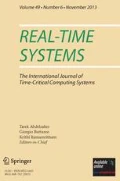This issue of the journal Real-Time Systems contains extended versions of four selected papers among the ones presented at the 26th International Conference on Real-Time and Network Systems (RTNS 2018), held in Poitiers in October 2018. From 54 submitted papers, 27 were accepted. The scope of the conference covered all aspects of real-time systems and networks. A selection of the papers presented at the conference were invited to submit extended versions for this special issue. These papers were selected based on their quality, relevance and originality.
-
The paper entitled “Tardiness Bounds for Fixed-Priority Global Scheduling without Intra-Task Precedence Constraints” is written by Sergey Voronov, James H. Anderson and Kecheng Yan. The work proposes to apply a relaxed sporadic task model to bound the deadline tardiness of tasks underlobal fixed-priority schedulers over an identical multiprocessor platform. The authors have shown that the derived bound is asymptotically tight and evaluated several prioritization strategies to control the per-task tardiness bound.
-
The paper entitled “A Novel View on Bounding Execution Demand under Mixed-Criticality EDF"” is written by Mitra Mahdiani and Alejandro Masru. The work deals with mixed-criticality scheduling using EDF and presents an approach where demand bound functions not only for LO and HI modes but also for the transition between these 2 modes. Evaluation results are presented for this approach and one of its approximation and compared to state-of-the-art algorithms (EDF-VD, ECDF, Greedy).
-
The paper entitled “Supporting I/O and IPC via Fine-Grained OS Isolation for Mixed-Criticality Real-Time Tasks” is written by Namhoon Kim, Stephen Tang, Nathan Otterness, James H. Anderson, F. Donelson Smith and Donald Porter. The work presents techniques for lessening the impacts of sharing I/O in mixed-criticality systems. The presented techniques can mitigate OS-induced interference in multicore real time systems. The conducted experimental study show that OS-related sharing can increase individual provisioned execution times.
We would like to thank the authors that submitted papers to RTNS 2018, and in particular to those who contributed extended versions of their RTNS submissions for inclusion in this journal special issue. We also thank the members of the RTNS 2018 program committee and also express appreciation to the referees for their time and effort in improving the quality of the aforementioned outstanding papers. Finally, the General Chairs of RTNS 2018, Dr. Yassine Ouhammou (Institut Supérieur de l'Aéronautique et de l'Espace—Ecole Nationale Supérieure de Mécanique et d'Aérotechnique ISAE-ENSMA), Dr. Frédéric Ridouard (University of Poitiers, France), and Dr. Emmanuel Grolleau (ISAE-ENSMA) deserve a special thank for their enthusiastic involvement in organizing the conference.
Author information
Authors and Affiliations
Corresponding author
Additional information
Publisher's Note
Springer Nature remains neutral with regard to jurisdictional claims in published maps and institutional affiliations.
Supporting I/O and IPC via fine-grained OS isolation for mixed-criticality real-time tasks, https://doi.org/10.1007/s11241-020-09351-2, 56:349–390, originally accepted for publication in this special issue was inadvertently published in Volume 56 issue 4.
Rights and permissions
About this article
Cite this article
Behnam, M., Jan, M. Selected papers presented at the 26th International Conference on Real-Time and Network Systems (RTNS 2018). Real-Time Syst 57, 1–3 (2021). https://doi.org/10.1007/s11241-021-09366-3
Accepted:
Published:
Issue Date:
DOI: https://doi.org/10.1007/s11241-021-09366-3

